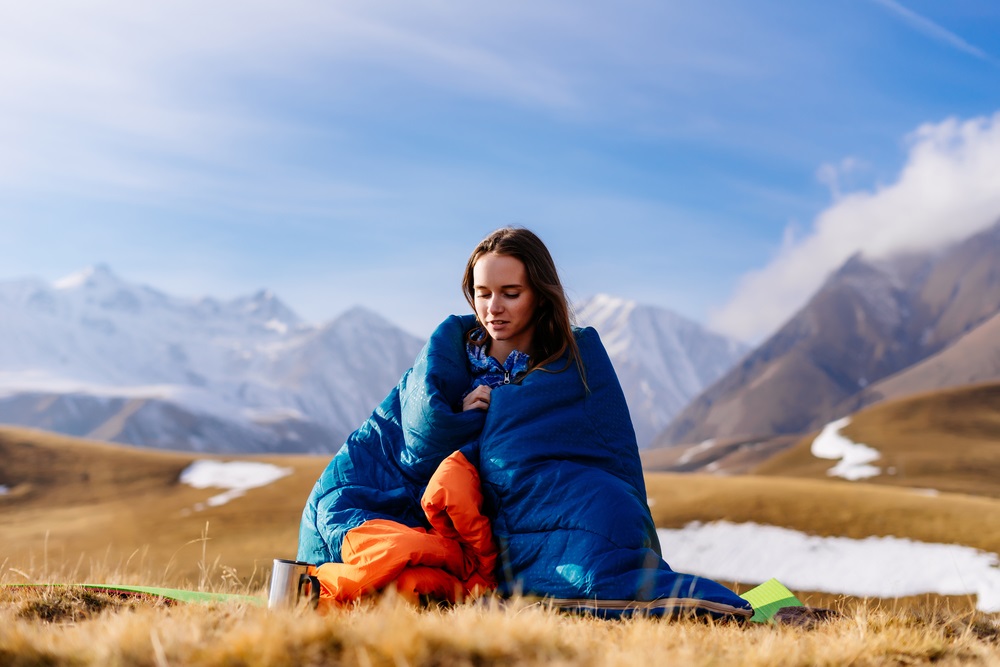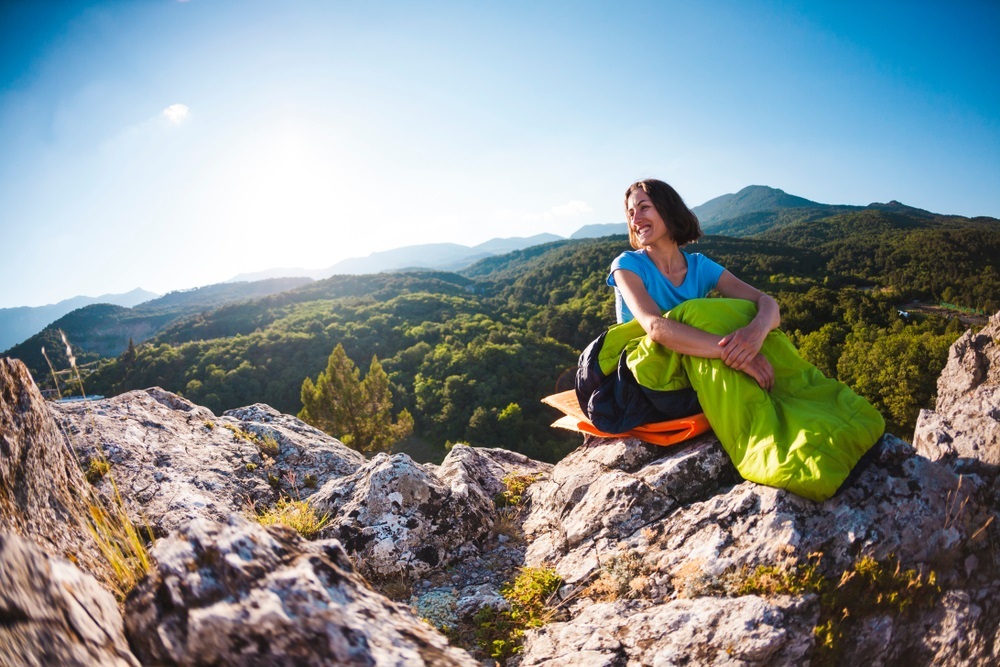Finding the perfect sleeping bag can be a game-changer for your outdoor adventures. Whether you’re browsing “sleeping bags on sale near me” or planning your next camping trip, understanding when to invest in a premium down or synthetic sleeping bag is crucial.
This guide will help you navigate the key factors to consider, ensuring you make an informed decision that enhances your comfort under the stars.
Understanding Sleeping Bag Materials
Down Sleeping Bags
Down sleeping bags are filled with the fluffy undercoating of birds, typically ducks or geese. This natural material is known for its excellent warmth-to-weight ratio. Down compresses well, making it a favorite for backpackers who need to save space and weight.
Pros:
- Lightweight and Compressible: Down sleeping bags are easy to pack and carry.
- Durable: With proper care, a down sleeping bag can last for many years.
- Warmth: Down provides superior insulation, especially in cold, dry conditions.
Cons:
- Water Sensitivity: Down loses its insulating properties when wet.
- Cost: Down sleeping bags tend to be more expensive than synthetic ones.
- Ethical Concerns: Some people may have concerns about the sourcing of down.
Synthetic Sleeping Bags
Synthetic sleeping bags use man-made fibers to mimic the insulating properties of down. These bags are often filled with polyester and are designed to retain warmth even when wet.
Pros:
- Water Resistance: Synthetic bags perform better in wet conditions.
- Cost-Effective: Generally, synthetic sleeping bags are more affordable.
- Hypoallergenic: Synthetic materials are less likely to cause allergic reactions.
Cons:
- Bulkier: These bags don’t compress as well as down, making them bulkier to carry.
- Shorter Lifespan: Synthetic fibers can break down faster than down.
- Weight: Synthetic sleeping bags are usually heavier than their down counterparts.
When to Choose a Down Sleeping Bag
Cold Weather Camping
If you often camp in cold weather, a down sleeping bag is a wise investment. The superior warmth and lightweight nature of down make it ideal for frigid conditions. Down sleeping bags are particularly beneficial for winter camping or high-altitude treks where temperatures can plummet.
Long-Distance Backpacking
For long-distance backpackers, every ounce matters. The lightweight and compressible nature of down sleeping bags can significantly reduce the weight and bulk of your pack. If you’re planning a thru-hike or a week-long trek, investing in a down sleeping bag can enhance your overall experience by making your load lighter and easier to manage.
Durability and Longevity
Down sleeping bags offer excellent durability. With proper care, they can last for many years, making them a good long-term investment. If you camp frequently and want a sleeping bag that will stand the test of time, down is a solid choice.
When to Choose a Synthetic Sleeping Bag
Wet and Humid Conditions
If you often camp in wet or humid environments, a synthetic sleeping bag is the better option. Synthetic insulation maintains its warmth even when wet, making it ideal for conditions where moisture is a concern. This type of bag is perfect for coastal camping, rainy climates, or kayaking adventures.
Budget-Friendly Options
For those on a budget, synthetic sleeping bags offer a cost-effective solution without sacrificing too much performance. If you’re new to camping or don’t venture out often, a synthetic sleeping bag can provide the warmth you need at a fraction of the cost of a down bag.
Ethical and Allergy Considerations
If you’re concerned about the ethical sourcing of down or have allergies, synthetic sleeping bags are a great alternative. These bags are hypoallergenic and don’t involve animal products, making them suitable for those with specific ethical or health considerations.
Key Factors to Consider Before Investing
Temperature Rating
Before purchasing a sleeping bag, check its temperature rating. This rating indicates the lowest temperature at which the bag will keep you warm. Make sure to choose a bag with a temperature rating appropriate for the environments you plan to camp in.
Weight and Packability
Consider how much weight and space you can spare in your pack. Down sleeping bags are typically lighter and more compressible, making them ideal for backpacking. Synthetic bags, while bulkier, can still be a good choice for car camping or short hikes.
Frequency of Use
Think about how often you’ll use your sleeping bag. If you camp frequently, investing in a high-quality down sleeping bag might be worth the cost. For occasional campers, a synthetic sleeping bag can provide adequate performance without a hefty price tag.
Personal Comfort
Personal comfort is paramount. Some people find sleeping bags more comfortable due to their softness and warmth, while others prefer the consistent feel of synthetic insulation. Try to test a few sleeping bags in a store to see which material and fit feel best for you.
Environmental Impact
Consider the environmental impact of your choice. Down sleeping bags often have a lower environmental footprint because they are made from natural materials.
However, ensure the down is ethically sourced, typically indicated by certifications like the Responsible Down Standard (RDS).
On the other hand, synthetic sleeping bags are made from petrochemicals, but some brands use recycled materials to mitigate environmental impact.
Comparing Down and Synthetic Sleeping Bags: A Quick Reference
Here’s a quick comparison to help you decide between down and synthetic sleeping bags:
| Factor | Down Sleeping Bags | Synthetic Sleeping Bags |
| Weight | Lightweight | Heavier |
| Packability | Highly compressible | Bulkier |
| Warmth | Superior insulation | Good, especially when wet |
| Durability | Long-lasting | Shorter lifespan |
| Cost | More expensive | More affordable |
| Water Resistance | Loses warmth when wet | Retains warmth when wet |
| Ethical Concerns | Potential ethical issues | No animal products |
| Hypoallergenic | Potential allergens | Hypoallergenic |

Making the Final Decision
Assess Your Needs
Evaluate your specific camping needs and conditions. Are you a frequent backpacker, or do you mostly camp in wet climates?
Do you prioritize weight and packability, or are you more concerned about cost and durability? Your answers will guide you toward the best sleeping bag for your adventures.
Try Before You Buy
If possible, visit a store and try out different sleeping bags. Feel the materials, test the zippers, and see how easily they pack down.
Many outdoor stores have demo models you can lay inside to get a better sense of comfort and fit.
Look for Sales and Discounts
Keep an eye out for sales and discounts, especially during off-seasons. You can often find high-quality sleeping bags at reduced prices. Search for “sleeping bags on sale near me” to find local deals and try to snag a premium sleeping bag at a bargain price.


